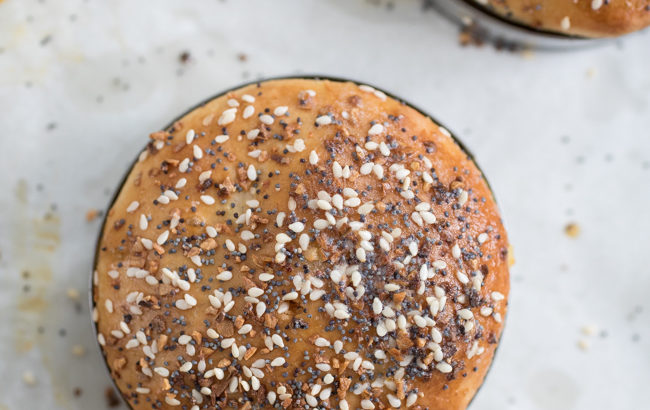
Potato Brioche Buns for Father’s Day
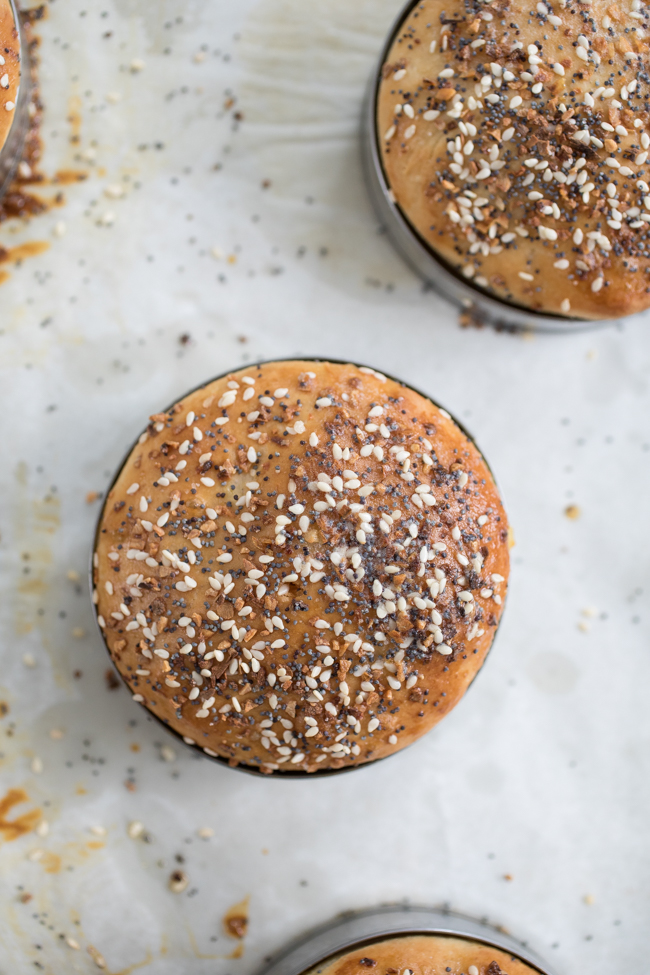
It’s almost Father’s Day (did you remember?) and that might mean pulling out the grill this weekend and serving Dad up some serious burgers. We came up with this soft and delicious Potato Brioche Bun to serve alongside your favorite burger recipe, and it’s easy enough to put together that the kids can jump in and help, too. As with all our no-knead, refrigerated dough recipes, you can bake as little or as much as you want. So if you are social distancing and only need a couple buns (because the grill-out party is small this year), this is a perfect recipe for that.
If cooking and mashing potatoes just seems like too much work (even for a holiday), you can always check out our straight up Brioche Burger Buns, complete with Lamb Burger and Cilantro-Yogurt Sauce.
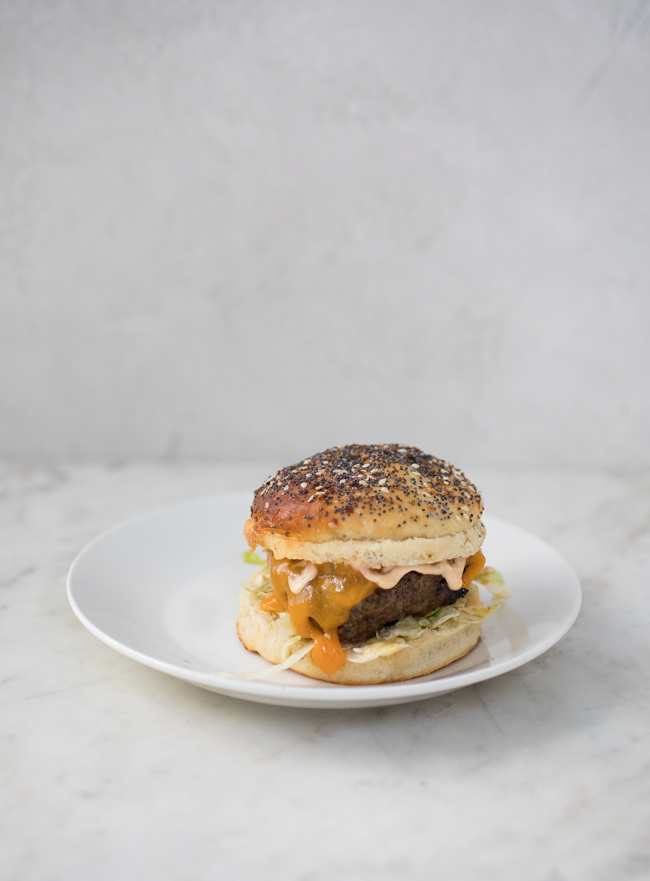
Potato Brioche Buns (based on the Brioche Recipe from New Artisan)
1 1/4 cup warm water
1 cup mashed Russet potatoes (sent through a food ricer for fine consistency, or mashed by hand)
8 tablespoons (1 stick) unsalted butter, melted
2 large eggs, room temperature
3 tablespoons granulated sugar
2 teaspoons yeast
1 1/2 teaspoons salt
4 cups all-purpose flour
Egg wash (1 egg whisked with 1 tablespoon water)
Seeds, for sprinkling (optional) – plain sesame seeds work fine; I used a bagel seed mix
Mix the water, potato, butter, eggs, sugar, yeast, and salt in a 5-quart bowl, or lidded (not airtight) food container.
Mix in the flour, using a spoon until all of the flour is incorporated.
Cover (not airtight), and allow to sit at room temperature for about two hours. Chill the dough for at least two hours, and up to 3 days.
The dough can be used as soon as it is chilled. This dough is way too sticky to use after the initial rise, but once it is chilled it is very easy to handle. That said, because potatoes can vary in their water-content, you may have to adjust the flour–you can add more after everything’s mixed, but give the dough a couple of hours on the counter to re-ferment or the buns will be dense.
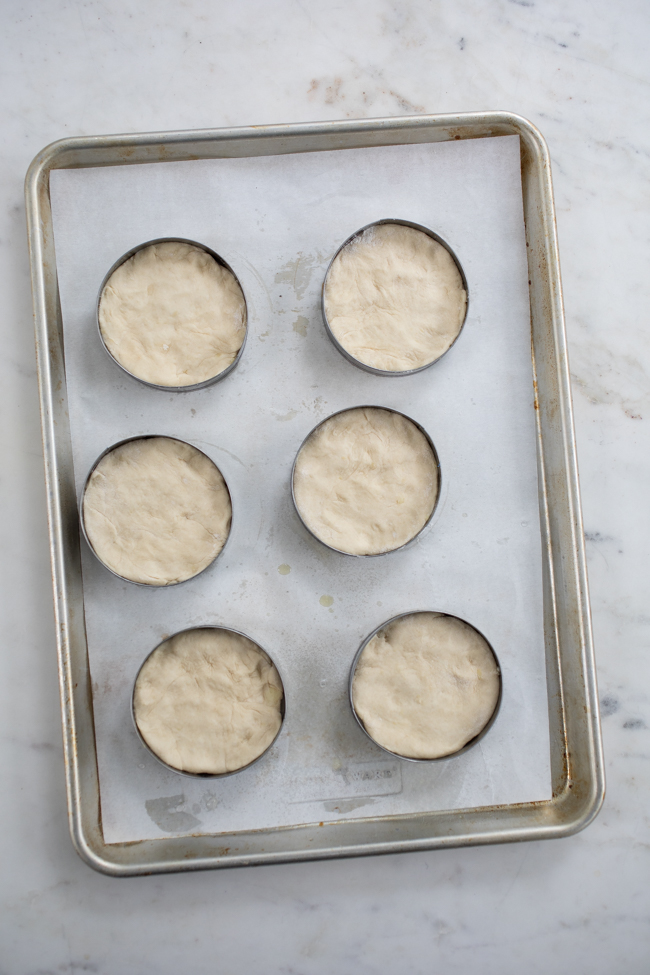
Divide the dough into 3 ounce pieces (this dough will make about 14 buns, but you can make less if desired). Gently smooth the pieces into round balls of dough. Grease six English Muffin Rings. Flatten the dough into 1/4-inch disks place them in the molds. If you don’t have rings you can make them free form, but they won’t keep their shape as well.
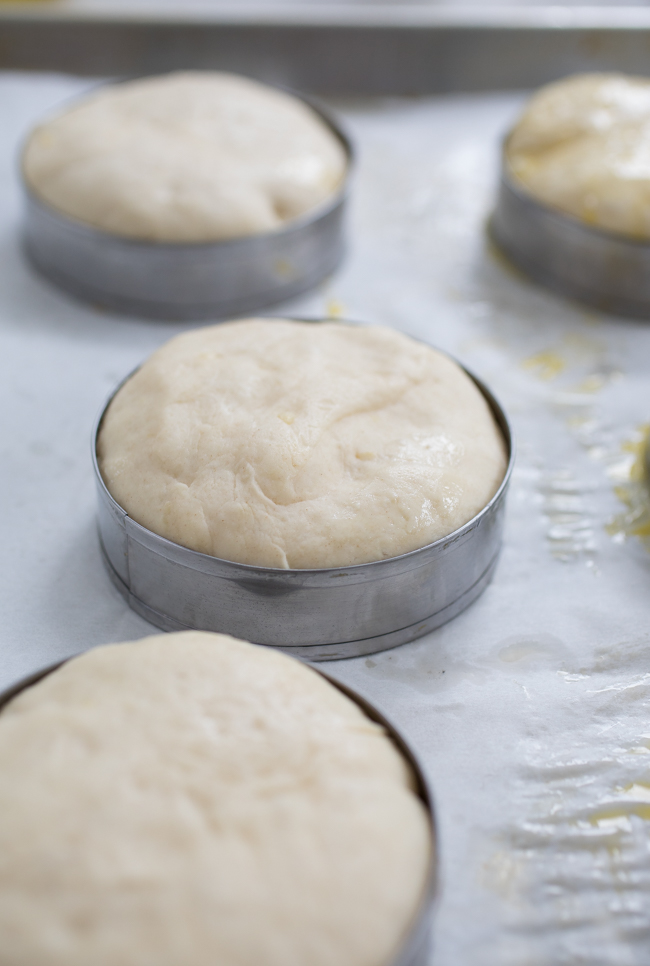
Cover loosely with plastic wrap (spraying the plastic with a little cooking spray will help it not to stick to the top of the buns) and allow the buns to rest for 30 to 60 minutes (depending on temperature of your kitchen), until the dough is just peeping over the top of the rings, and feels like a marshmallow when gently pressed/jiggled.
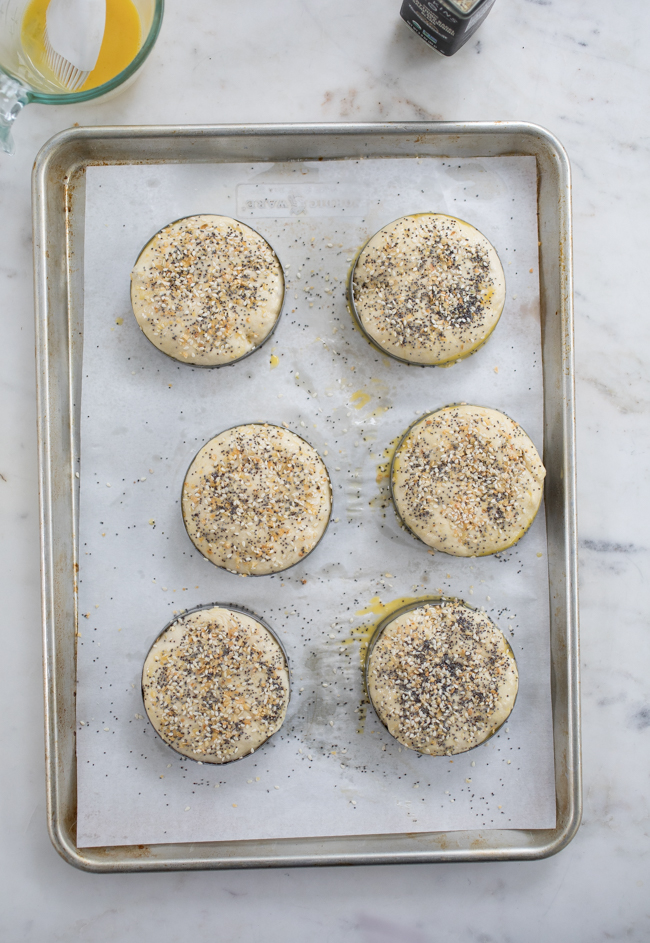
Place an oven rack in the center of the oven, and preheat your oven to 350 degrees.
Use a Pastry Brush to paint on the egg wash, and then sprinkle with seeds if desired.
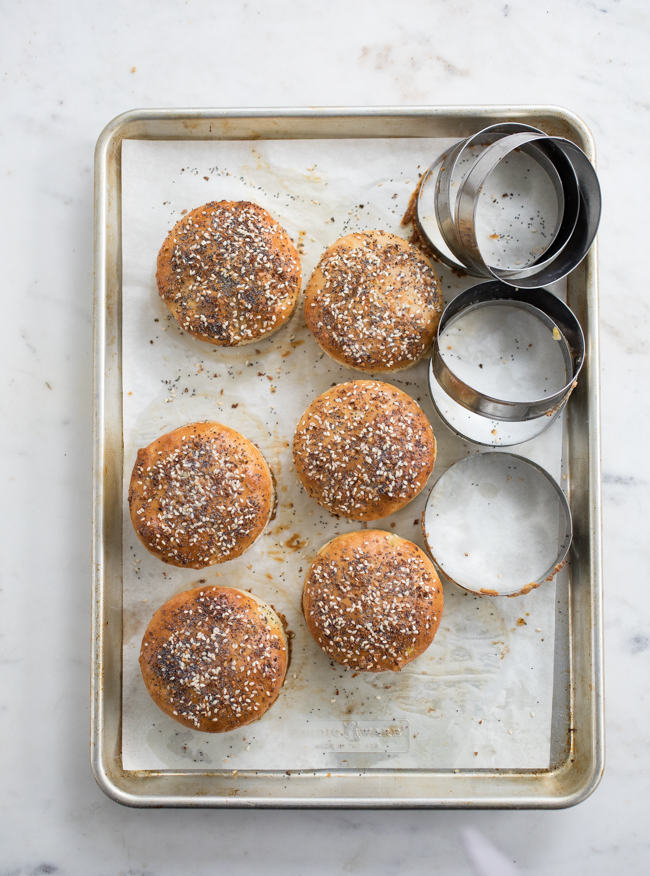
Bake for 20 to 25 minutes until they are golden brown (I baked with steam for an extra soft bun, but you don’t have to do that).
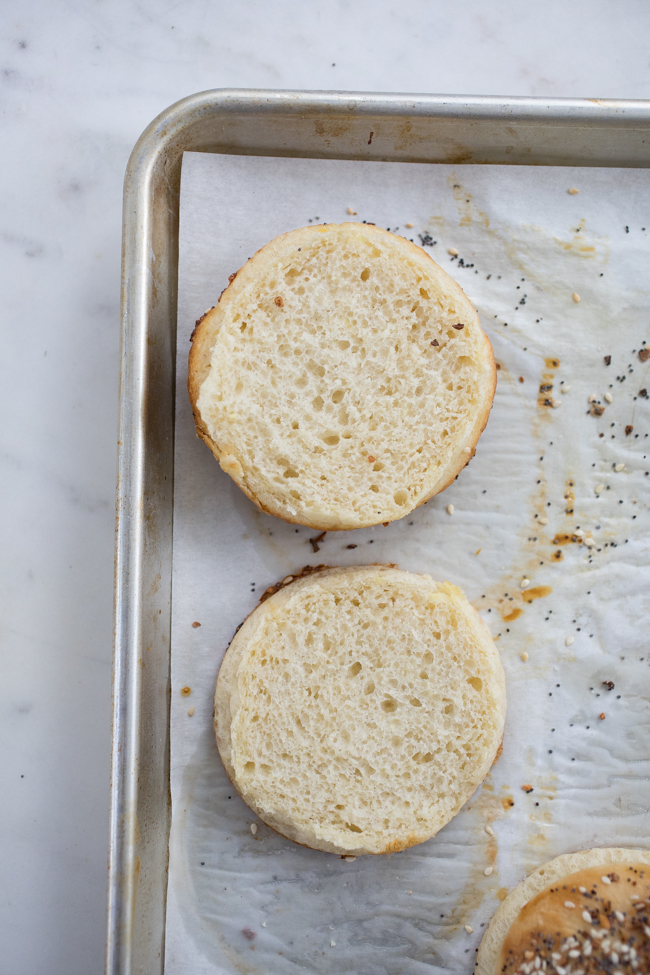
Perfect for loading with a burger and toppings, or just nibbling on with a slice of cheese.
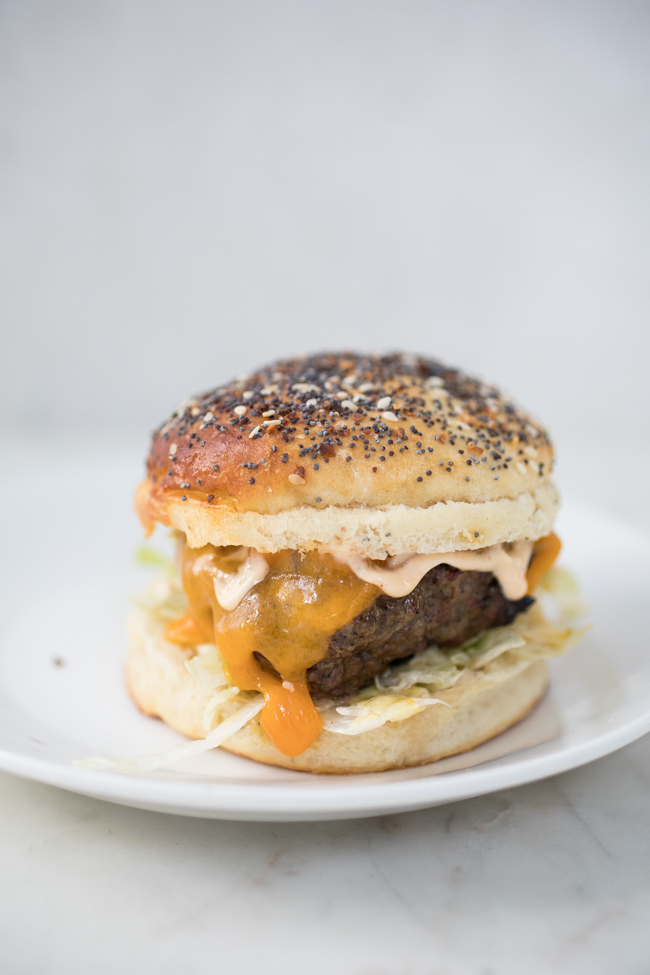
Can this recipe also make a potato brioche loaf, or will it be too soft for slices?
We’ve tested with this amount of potato in non-brioche loaves (see page 193 and 195 of The New Artisan Bread in Five Minutes a Day, https://artisanbreadinfive.com/artisan), but not with this particular formula as a loaf. My guess is that it’d work, but this’ll be an experiment…
Can you sub out potato flakes or instant mashed potato?
it should work, but I’d recommend reconstituting them with water according to the package directions, and then measuring out a cup of the finished mashed potatoes.you can probably figure out a way to just use the dry flakes, and some more water in the recipe but I’m not sure how to advise you on that
Potatoes are generally 75-77% water so for flake 4eplac8ng 1 cup boiled potatoes go with 1/4 cup potato flakes and add 3/4 cup of water. FYI you can look up the various water contents 9f most things with a simp,simple, search then just hit the calculator to work out the actual weight or volume depending. I use only weight I all cooking these days but especially doughs.
Could I use potato flour instead of mashed potatoes? What adjustments would be needed?
It’d probably work, but since we haven’t tested that, you’d have some trial and error ahead of you. My guess: 1/2 cup of potato flour, with additional water to get the dough to the proper consistency.
Hi there folks,
I always look forward to getting your posts, thank-you!
The thing is, I only make sourdough bread now, and often you do not give the recipe for use with a starter. I am not very good at converting yeast to starter vice versa -any hints there? I would love to try many of the recipes you send, but this is always a barrier for me. This potato bun recipe looks particularly delicious, as we love burgers here, and have stopped buying buns at the store since I began sourdough baking. Can you translate the recipe to suit a stater for me?
Do you have our book that describes sourdough in more detail (https://artisanbreadinfive.com/healthy)? If not, have you been on our page here on the website that gives some of that information (type “easy sourdough” into our Search Bar above). Keep in mind that our publisher will never speak to us again if we re-create our books here on the website–our books are the real source for this info.
In this recipe you baked just 6 buns in 6 rings. If you want all 14 buns, do you chill the unused dough, then shape and refill the rings, and repeat until you have used all the dough? It sounds like an all-day process. Any suggestions to get this done in one go? Thanks!
You can simultaneously bake as many buns as you have rings for, no need to break it up if you want more all at once.
OK. I only have 4 rings, so I will either make it an all-day process, or I will make them free-form and hope for the best (buns, and not pancakes). Could these be done in a large muffin tin? Thanks for your response.
Make them freeform, that’s what I generally do anyway. Large muffin tin should work yes!
You can make extra rings by folding up aluminum foil then form a ring using one of the steel english muffin rings as a form. Just staple the ends together crimp ends side out. Takes about 2 mins per ring to make and they can be reused..
I just wish one of these recipes would give weight of dough for different sized buns. From 3″ thru to at least 5″ in 1/2″ sizes would covers most every hamburger size. PersonallybI I like a 5 1/4 double patty smash burger using 4-5oz patties on a 5″ bun. Meat 1 part brisket 1 part trimned short rib, 1 part sirloin 1/4 part suet (beef kidney fat) enough to get you to 80/20 ratio.. after lots of testing that to me is the perfect ratio of texture flavor moisture. If nmak8ng normal non smash burgers create an indention in the center of the parry will prevent shrinkage and puffing up. The thicker the patty the more effect it will have.
Do you have a version of this that is gluten free? Or do you have any suggested tweaks to adapt this for your gluten free Brioche from your gluten free book?
Hi Bre,
We don’t have one, so you’d have to play with adding the potato. The issue is creating a bread that is super dense, so add it gradually and I’d make a small batch until you have something you really like.
Let us know how it goes. Zoë
Any tweaks I should make if I have some red or Yukon potatoes I want to use up?
Probably won’t matter, though we haven’t specifically tested this…
This is the recipe I was looking for, Savory Buns, I’m not too sweet, so it’s not always easy to find salty things. That doesn’t stop us from loving your site which is fabulous … And every once in a while, when I need a sweet recipe, I know I’ll find what I’m looking for here. Go Buns now !!! Thank you
Thanks for the kind words!
This recipe did not work for me at all. The dough is VERY wet. Even with hours of chilling, it was almost impossible to work with–it was so sticky. When baked in English Muffin rings, the surface was uneven, short in height and so delicate that it collapsed in taking them out of their rings. It was more like a popover than a hamburger bun.
Tomorrow I will add more flour to it and try to get a stiffer dough. I followed the instructions to the letter, including all the wait times. I’m an experienced baker–I make at least 4 loaves of bread a week–so this really puzzled me. I’m surprised no one else reports problems with it.
How familiar are you with our wet-dough method? It could be helpful to start with our basic recipe in https://artisanbreadinfive.com/artisan, since you’ve chosen a complicated recipe to start with. When things turn out too wet, items to check:
Brand of AP flour: any chance you’re using low-protein flour like White Lily? The recipes are tested with Gold Medal.
How are you measuring flour? See https://artisanbreadinfive.com/2010/04/28/how-we-measure-our-flour-using-the-scoop-and-sweep-method If you’re using “spoon-and-sweep” method, the outcome will be too wet.
Aside from this, I agree with your plan to just add more flour until it’s manageable and this will solve your problem. The issue with this recipe is that the potatoes have variable moisture–some are wetter than others, so adjusting the flour can be necessary. Give the newly mixed dough a couple of hours at room temperature to start a new ferment or else the results will be dense.
Thank you for the quick response. I am moderately familiar with the wet-dough method–I recently made 2 batches of King Arthur’s “Recipe of the Year” Cinnamon rolls–and that dough was wet but manageable. Yesterday I also made Hot Cross Buns from the “Cloudy Kitchen”–and they came out perfectly. I make pizza regularly with a wet dough. I use a wonderful flour–Central Milling Company Organic Unbleached AP–considered a superior flour here in the San Francisco Bay area–many professional bakers use it. I did use the “spoon-fill and sweep” method (everyone else tells me to!)
Last night before bed, I added ~1/2 cup of flour, mixed it in and this morning it looks terrific. I’ll let it warm up and ferment and I’ll try baking the rolls today.
I think that’s a good point about the potato–I boiled it (just for this recipe) so it may have taken on too much water. My Italian grandmother used to be very fussy about how she cooked potatoes for gnocchi–she would only steam them–never boil them–just so she didn’t have to add too much flour–and make them “tough.” I didn’t think of that at the time–but I bet that’s it! Good thought, Jeff! Thank you.
Definitely a contributor, but the measuring difference between scoop and sweep vs spoon-and-sweep is very significant. Adding more flour just corrected for that.
Thank you for all the input and help. I added more flour last night, let it ferment a few more hours today and then weighed out 4 buns, shaped using a little more bench flour and then baked them. They are still very delicate and are “pinched in” where the ring is. The bottom comes out perfectly, the top was okay, the midsection was wonky.
The big question here, for me, is why don’t chefs and recipe writers standardize their flour-measuring methods? Or at least state them clearly and specifically. This is getting a little bit crazy! Weighing flour is the only way to go.
If you make this recipe again could you please take the extra time to weigh each of the ingredients (all of them). As its the only way to get a truly accurate repeatable dough recipe. Then we can get an accurate bakers percentages for the recipe to adjust for increase/decrease volume of dough. I am sure it will be very helpful to newer bakers that do not have the feel yet for what wet doughs feel and act like. Get a flour with similar protien content and you get almost spot on everytime when using weight. Also easier to find the issue when not wondering if your potatoes have more water (weigh more for the cup) or flour sugar salt are the same or is grain size or measuring spoon slightly different.
Thanks so much for posting this Brioche Potato Hybrid Bun recipe!!
It addresses issues each had. Richness of Brioche with increased structure of the Potato bread side. Stronger crust to hold up to juicy meat. Made some minor adjustments but it came out great.
Next time I will switch to potato flakes or flour and either adjust water or add milk. Only want to n adjust one thing at a time as the base recipe is very good. Just trying to make it less time consuming to not have to cook potatoes. One other thing to try after that is using 50 g of the total flour to make a yukone/tangzhong roux with 200- 250g milk or water. See what effect that has. I like to tinker with recipes to learn.
Again many thanks for taking the time to post these many recipes and pictures. Also you reply to comments way more than many other blogs/sites. It appreciated!